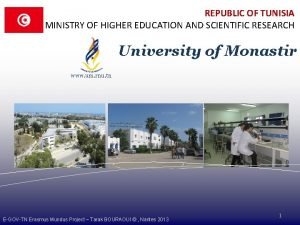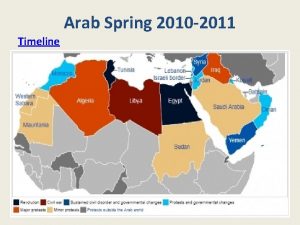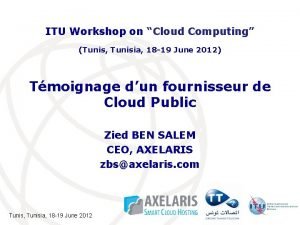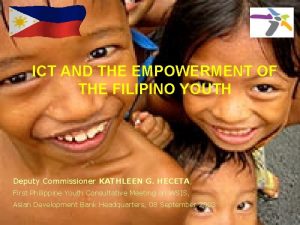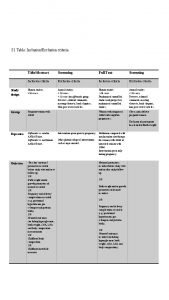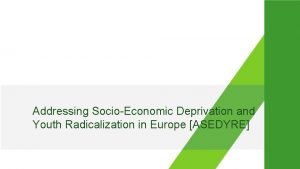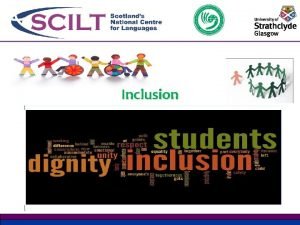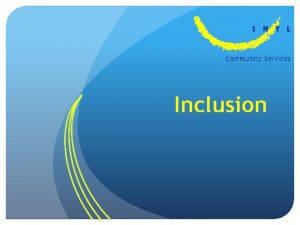COUNTERING YOUTH RADICALIZATION IN TUNISIA THROUGH INCLUSION Tunisia














- Slides: 14

COUNTERING YOUTH RADICALIZATION IN TUNISIA THROUGH INCLUSION Tunisia This work was carried out with the aid of a grant from the International Development Research Centre, Ottawa, Canada.

About the Maghreb Economic Forum (MEF) The Maghreb Economic Forum (MEF) is an independent Think-and-Do Tank founded in 2011 on the premise of supporting economic and social development in the Maghreb region. Our mission is to convene and mobilize diverse actors to catalyze sustainable economic and social development in the Maghreb. MEF believes that an informed, active citizenry is the key to building sustainable economies and inclusive societies. MEF seeks to promote an informed public debate on critical social and economic issues through evidence-based research and its translation into concrete policy recommendations. In doing so, MEF uses the 2030 Agenda for Sustainable Development Goals (SDG‘s) of the United Nations as a framework for its actions. In this endeavor, MEF operates by: Conducting research and publish policy analysis on contemporary issues in the Maghreb; Fostering dialogue among key community stakeholders; Transforming research into impactful action; Our Values: MEF’s primary values are that we are: Independent Non-profit Non-partisan

Context of The Research Study • Tunisian Jihadists joining radical groups in conflict zones like Afghanistan (80 s), Bosnia (90 s) and Iraq (2000 s). However, the country has never witnessed a major terrorist attack or any kind of Jihadi activities on its soil until the late 2000 s (Soloman 2007). • Post-Revolution: After the up-rising that Tunisia has witnessed in 2011, the newly emerging democracy has seen a dramatic rise in terrorism. Many of its youth have decided to join radical groups within the country and outside it. • Economic, social and political instability has fueled this wave of radical exodus. The feeling of frustration, injustice, failure along with lack of equal economic, social and political opportunities are among the main drivers of youth radicalization.

Research Study's Problematics This research study is an examination of the following problematics: • What leads Tunisian youth to radicalization? • What leads Tunisian youth to de-radicalization? • What are the best practices, approaches and strategies that should be adopted by State institutions, local stakeholders, COS' actors that works on the prevention and tackling youth radicalization?

Theoretical Framework The research study's theoretical framework is based on the following theories: • The implication of "exclusion" in the process of radicalization. • The impact of "inclusion" on the process of de-radicalization. • The effectivity of the existing preventive/de-radicalization programs in the Tunisian context. Throughout, the first two theories the research team is studying the root causes of radicalization and their link to "exclusion". Additionally, they are going to examine the root causes that lead to de-radicalization and to assess its link to "inclusion". Whereas, the last theory is a process of analyzing the existing programs in Tunisia and aboard in order to create a manual of best practices that should be adopted within inclusive programs that fit into the Tunisian context.

Methodological Path and Gender Integration Methodological Path: • The methodology of the research study is based on a mixed-method approach with a slight inclination towards a qualitative method. • First step: Literature Review: with focus on root causes of radicalization, the notion of inclusion and the process of de-radicalization/disengagement. • Second step: Data collection and Analysis: 16 focus groups were conducted in the regions of Gasserine and Tataouine, as well as, the two neighborhoods of Elettadhmen and Sidi Hassine. Participants were divided according to age; first group age was between 18 and 25 whereas the other group age was between the 26 and 35. Within these focus groups, these following indicators which were derived from the research literature review were tested: Civic Engagement, Political Engagement, Religion, Society, Employment and Education.

Assumptions Research Statement Inclusion affects Tunisian youth disengagement Inclusion is a major factor in reinforcing Tunisian youth disengagement Existing prevention and disengagement programs do not fit in post-revolutionary Tunisia Inclusive approaches reinforce youth disengagement in post-revolutionary Tunisia Research Questions To what extent does inclusion affect Tunisian youth disengagement? Do existing PVE (prevention) and CVE (countering) programs fit in postrevolutionary Tunisia? Research Aims Understand what motivates disengagement in the Tunisian context Adapt prevention and disengagement programs to inclusion in the Tunisian context Research Objectives Understand root causes of Tunisian youth radicalization Assess what role inclusion plays in motivating someone to join and exit Understand disengagement process and root causes Understand inclusion in the Tunisian context Analyze existing prevention / Disengagement programs abroad Analyze existing prevention / Disengagement programs in Tunisia Analyze the Tunisian Context in relation to youth inclusion and radicalization

Steps of the Path Literature Review Inclusion Radicalization Identify indicators Focus Groups (Youth) Inclusion in Tunisia: Perceptions of Youth Test indicators Interviews (returnees) Inclusion: The Effect on Radicalization Deradicalization Inform research on the impact of inclusion as a driver of behavior change Adjust programs and policy to include inclusion in P/CVE approach in Tunisia Testing the definition and impact of inclusion

The analysis is based on coding the "cognition" and "behavior" of the research's subjects. The "cognitive" aspect is about coding the answers, whereas, the "behavioral" is mainly coding the participants' interaction and response to the questions. After sorting the answers according to the frequency of the code, as well as, studying the intensity of their interaction and response to the questions, the out-turn of each sorting was labelled to an indicator. This process was iterated until a result was reached. At a final stage, the indicators were ranked from "important" to "less important", and therefore, the "inclusion" definition was created.

The result: Inclusion in the Tunisian context is Social Acceptance, Civic Engagement and Employment.

Gender Integration: • The focus groups were gender based. Female participants were interviewed separately in an all-female focus groups in order to give them more space to voices their point of views and to share their experiences. The questions was tailored to give them the opportunity to share their perspectives without any pressure and to address their concerns. • The research results are gender-oriented. • 50 per cent of the research team is female researchers who works relentlessly to develop innovative policies that would help mitigate the impact of radicalization and violent extremism.

Ethical consideration • Informed consent: The research subjects were informed about the research topic and were granted anonymity, as well as, confidentiality. • The subjects were ensured safety and provided with a safe space to express themselves. • Questions of the focus groups were respectful to the local social and cultural characteristics of each region. (Mainly related to religion and social relationships. ) • Gender consideration: the female participants were given the space to speak their minds and to express themselves freely. • The subjects were given the immunity and the freedom to withdraw from the focus groups whenever they feel uncomfortable, as well as, they were given the chance to not answer any question due to invasion of privacy.

Activities’ Outputs and Outcomes Training on Data Collection and Protocols • • Training on Methodology Data Collection (Focus groups and Interviews) • Develop research methodology: Research statement Research assumptions Research questions Research objectives Data collection protocol Data collection guides Ethics and Security protocol • • • Research questions answered Tunisian definition of Inclusion Training on writing articles and policy briefs Annual Conference Policy briefs on the legal framework. Article on media portrayal of violent extremism in Tunisia • • Focus groups' report Data analysis report • • • Annual conference report 2 op-eds 3 articles Social media posts Conference Video shared on social media. Media appearance in local radios advocating the project. The policy brief recommendations were taken into consideration when amending the Antiterrorism law.

Thank you for your attention
 Mozzified
Mozzified Niloofar piri
Niloofar piri Ministry of higher education tunisia
Ministry of higher education tunisia Tunisia cartina fisica
Tunisia cartina fisica Tunisia arab spring timeline
Tunisia arab spring timeline Cloud computing tunisie
Cloud computing tunisie Empowerment through ict
Empowerment through ict The poet used candles and lanterns to
The poet used candles and lanterns to Through one man
Through one man Dome of furcation
Dome of furcation Tangent-sawing
Tangent-sawing Inclusion exclusion principle
Inclusion exclusion principle Inclusion works creating child care programs
Inclusion works creating child care programs Exclusion critera
Exclusion critera Centre for gender diversity and inclusion statistics
Centre for gender diversity and inclusion statistics


